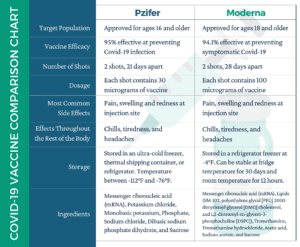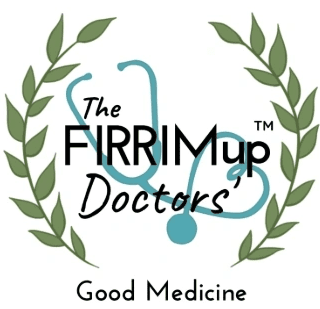Pfizer-BioNTech & Moderna COVID-19 Vaccines
The development of a typical vaccine is an extensive process. It usually takes about 10-15 years to perfect and bring to market. As COVID-19 took us by surprise, and cases are still increasing each day, the hunt to find a highly effective vaccine took place over the course of just several months. Two of the most efficacious vaccines were made by two large medical manufacturers: Pfizer and Moderna. After reading this blog post, you will be able to have a better understanding of each vaccine and see which one is right for you.
Pfizer-BioNTech & Moderna COVID-19 Vaccines
What are they?
Both Pfizer and Moderna are considered to be messenger RNA (mRNA) vaccines, which means that they teach one’s body how to create a protein. This protein then sets off the body’s immune response to activate immune cells and generate antibodies, which are the defense mechanisms used by the body to attack the virus and prevent infection by the virus.
Traditional vaccines inject inactivated strains of live virus or parts of the live virus into the body to trigger an immune response. In comparison, these new Moderna and Pfizer vaccines don’t actually contain the live virus, but rather contain mRNA strands that code for a protein to activate the immune system.

Who should avoid getting the vaccines: *CDC recommendations *
- If you have had a severe allergic reaction (anaphylaxis) or an immediate allergic reaction to any ingredient in an mRNA COVID-19 vaccine, you should not get an mRNA COVID-19 vaccine.
- If you have had a severe allergic reaction (anaphylaxis) or an immediate allergic reaction after getting the first dose of the vaccine, you should not get a second dose of an mRNA COVID-19 vaccine.
- An immediate allergic reaction means a reaction within 4 hours of getting vaccinated, including symptoms such as hives, swelling, or wheezing which can cause respiratory distress.
- Allergic reactions to polyethylene glycol (PEG) and polysorbate are included. Polysorbate is not an ingredient in either mRNA COVID-19 vaccine but is closely related to PEG, which is in both vaccines. People who are allergic to PEG or polysorbate should not get an mRNA COVID-19 vaccine.
The FIRRIMup™ Doctors strive to provide our patients with the most up to date and credible news for health that is available. We hope our blog provides you with beneficial knowledge, as we continue to evaluate all information as it becomes available regarding the COVID-19 virus and the novel COVID-19 vaccines. It may take months to see the effectiveness and full side effect profiles of these vaccines. We remain hopeful, throughout these uncharted times, that effective therapeutics will emerge, while we progress toward herd immunity.
If you still have any questions about the vaccine or if it is right for you, please contact FIRRIMupDoctors@gmail and request an appointment.
Resources:
Pfizer-BioNTech
https://www.fda.gov/media/144245/download
https://www.cdc.gov/coronavirus/2019-ncov/vaccines/different-vaccines/Pfizer-BioNTech.html
https://www.pfizer.com/news/hot-topics/the_facts_about_pfizer_and_biontech_s_covid_19_vaccine
https://www.cdc.gov/vaccines/covid-19/info-by-product/pfizer/downloads/storage-summary.pdf
Moderna
https://www.fda.gov/media/144434/download
https://www.cdc.gov/coronavirus/2019-ncov/vaccines/different-vaccines/Moderna.html
Pfizer-BioNTech & Moderna
https://www.cdc.gov/coronavirus/2019-ncov/vaccines/different-vaccines/mrna.html
